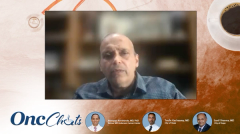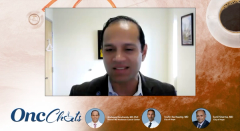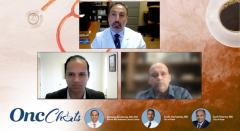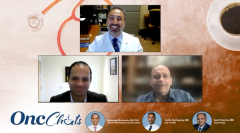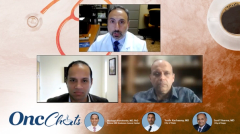
Leveraging Immunotherapy in GI Malignancies: A Shift in Drug Discovery
In this episode of OncChats: Leveraging Immunotherapy in GI Malignancies, experts discuss the potential benefits of utilizing immunotherapy approaches earlier on in the disease course.
Episodes in this series

In this third episode of OncChats: Leveraging Immunotherapy in GI Malignancies, Toufic Kachaamy, MD, of City of Hope, Sunil Sharma, MD, of City of Hope, and Madappa Kundranda, MD, PhD, of Banner MD Anderson Cancer Center, discuss the potential benefits of utilizing immunotherapy approaches earlier on in the disease course.
Kachaamy: Currently, most of the way we cure or treat early cancer is procedure based or surgically. Do you see drug discovery potentially shifting focus to using drugs to treat early malignancy? Or some kind of transition to immuno-oncology in that area?
Sharma: As you all are aware, [there has been] recent success in treating rectal cancer in a microsatellite unstable type area [in that] radiation combined with immunotherapy gave a very high response rate. That’s an area where surgery can be difficult for patients and [can impact] quality of life. I think that’s a very good example. Obviously, that example [has to do with a] small number of patients. I do think there’s a huge potential as therapies become more effective. One of the things that one has to realize in oncology is that marginally effective therapies in metastatic disease can actually be very highly effective if used earlier. There are examples of that in oncology and [specifically] in breast cancer, for instance, where [if a patient has] HER2-positive breast cancer and metastatic disease, then [these agents] are quite effective but they are not curing the patient. [However,] if you use [those therapies] earlier on, they actually cure a lot of patients. We’re talking about marginally effective therapies in metastatic disease [that are] curing people when used earlier. [So to reiterate,] this is another thing to think about in GI oncology, where a lot of the therapies medical oncologists use in the advanced setting are not necessarily that effective, but as they become more effective and they’re used more in the earlier setting, more patients will be cured.
We are making some advances in the more garden-variety colon cancers with immunotherapy. I mean, the latest data on some other checkpoint inhibitor combinations look quite interesting and are showing efficacy in the metastatic setting. Again, the tail end of the curve is still to be determined but [I think if] those [approaches] were used up front, we’re likely to see much more efficacy in that setting than what we’re seeing in the metastatic setting. But certainly, that paradigm of moving therapies up front is moving forward more quickly than it ever used to be. I’m old enough to [have been around before] these [kinds of] trials were being done. But now, we’re moving [these agents] up front more quickly because we want to have more effectiveness [with] these therapies.
Kundranda: I think you hit on two key points with regard to this, Dr Sharma. [One] truly [has to do] with younger patients being diagnosed. We’re seeing a lot of these 20- and 30-year-olds in our colorectal and esophageal clinics [who have] metastatic disease or locally advanced disease. One of the key things is organ preservation. Although it is 5% to 8% of these MSI-H patients with rectal cancer achieving a complete clinical and radiological CR with organ preservation certainly seems to improve their quality of life as opposed to somebody having an ostomy. So, that has certainly made a huge difference for a lot of patients.
The one thing that is actually exciting that you did touch on is that when we look at immunotherapy, in this microsatellite stable patient population, which is the majority of our patients, our successes have been minuscule. We are making better progress [though] looking at the whole spectrum of immune-oncology. Within immuno-oncology, the one challenge that we’ve seen is that the clinical field has moved faster than the basic science per se. We’re seeing responses, and then we’re looking and questioning, “What is it that made that patient respond?” Then, we’re identifying those patients.
Do you see this changing in the context of whether you’re using IO therapy in the neoadjuvant chemoradiation population, so within an MSS patient, [who are] again, [our] more common patients? How do we approach that? That is where true multimodality patient care comes into play.
Sharma: You’re asking exactly the questions that need to be asked. Immunotherapy [research is] super exciting stuff. As we all know, a few years ago [this work has been recognized with] the Nobel Prize and it has [led to] a sea change. Single checkpoint inhibitors haven’t been that useful in MSS colon cancer, but [there have been] really exciting data that we had the good fortune of participating in and have also been presented at the ASCO and ESMO [meetings]. Hopefully, [those data] will come out in a publication very soon, but they are showing that if you use potent checkpoint inhibitors together—for instance, an Fc-enhanced CTLA-4 antibody with a PD-1 antibody—it has about a 25% response rate in MSS colon cancer. [That said,] it's early days. A randomized phase 2 study of those two agents has just finished accrual. As such, we’re going to get the randomized phase 2 data, and hopefully that would mean that we can get [more information on] this therapy in [those with] heavily metastatic disease. We’ve already seen that subsets of the patients within the MSS population respond better. For example, patients who have liver metastases have a lower response rate to this checkpoint combination than [those who] have lung metastases, for instance.
As you rightly said, the clinical observations are actually trumpeting a little bit on biology. For IO therapy, specifically, biological models are very, very difficult because when you’re doing in vivo models in mice, you really cannot use human tumors in those mice because they have to be immune-competent mice. As such, the IO models in mice are not very well translated into humans so we have limitations preclinically there. However, for instance, this combination therapy is really an amazing advance because single checkpoint [inhibition] wasn’t working—even the first generation of CTLA-4 antibodies had limited activity. But [by] enhancing some of these checkpoints, you just see that a subset of those patients, specifically certain organ types where the colorectal cancer metastasized have higher response rates, and we don’t actually know what their overall survival is because the patients are still being followed. So, I would count that as a major advance, but not completely satisfactory. But if you take that and you use it in earlier phases, you can probably expect much, much more benefit for patients.
The key question would be: How do we move this immune therapy up front? Also, what kind of patients should we select? All of that [information] is coming. Then, the other [questions that are raised are,] how do you enhance these immune therapies? Can we add a third immune therapy? Should we add chemotherapy to that? But frankly, when I joined [the] oncology [field], I was hoping to ride a wave of science—and boy, have we been lucky. From the time I started my career 20 years ago in GI oncology, I remember we only had 5-fluorouracil. Basically, that’s all we had. Now, even with limited advances in what we do, [we’re moving forward,] so I’m very optimistic.
To answer the other part of your question, how do we make more advances and learn biology? I’m a big believer that you have to get the phenotype first. I mean, we can study the biology, which is very interesting and all of that, but [if] we have the clinical observation of a phenotype, then it’s really beautiful. Then we can take the biology, take five people who responded, [for example,] and really do a very magical thing from sample collection to really dissect out science much faster than just doing preclinical work all the time and trying to figure this out from the other end. As such, we’re really lucky that the gastroenterologists, like Toufic, can work with us, get us the samples, and [we can then] work together to dissect [this information] and really move [these approaches] earlier on to make these diseases, hopefully, curable, which is really difficult right now.


